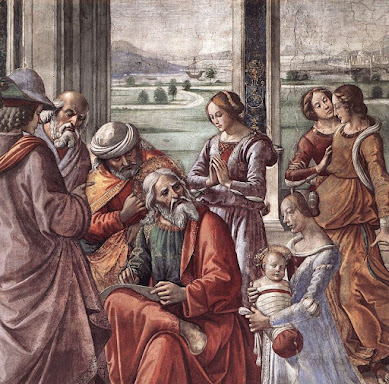In the beginning was the Word,
and the Word was with God,
and the Word was God.
In Genesis we read about God's Word at work in the beginning of creation. He spoke and the world was made and the light and the darkness were created. His Spirit was there as well, hovering over the waters, manifesting his power. This morning we read about the beginning before that beginning, the beginning that had no beginning. Before all creation, before anything Genesis records, the Father, Son, and Holy Spirit lived together in eternal harmonious bliss.
John wrote to draw our attention in a special way to the Word of God. John wanted us to be clear that the Word was not created, that he himself was not a thing that came to be. He was not some first creation or emanation from emerging from God as some early heresies may have described him. Much less was he a limited and finite creature such as ourselves.
All things came to be through him,
and without him nothing came to be.
Yet John wanted to be equally clear that it was this very eternal and divine Word, this reason or logos of God himself that truly became man and dwelt among us.
And the Word became flesh
and made his dwelling among us
and we saw his glory,
the glory as of the Father’s only-begotten Son,
full of grace and truth.
Setting aside the mystery of how the divine could join to itself a human nature that still leaves a question about why he would do so. The key to that answer comes later in John when we read, "For God so loved the world that he gave his only Son". Yet we see aspects of an answer already in the first chapter.
But to those who did accept him
he gave power to become children of God,
to those who believe in his name,
who were born not by natural generation
nor by human choice nor by a man’s decision
but of God.
The true source of all light that always shone in the darkness, uncomprehended and undefeated, wanted to shine in a more tangible and sensible way upon us. We had always had a choice of whether or not to accept the light. Now that choice would be made more concrete and, to sincere humble, more compelling.
because while the law was given through Moses,
grace and truth came through Jesus Christ.
We can see that Jesus came to us to reveal the Father. He did not do this by lengthy philosophical discourse but by making us share in his own divine Sonship. His own Spirit within us would cry out, "Abba" just as it did from within his own heart. This, and not the mere forgiveness of sins, was the fullness of God's plan of salvation. Jesus himself was an icon of the Father's love. Salvation was now to be found in him alone and it was by our response to him coming to us that we would give our consent to that plan, or otherwise to ignore it and prefer the darkness.
No one has ever seen God.
The only-begotten Son, God, who is at the Father’s side,
has revealed him.
The Father remained distant until Jesus came. At times he may have seemed capricious or unkind. Jesus came to clean the glass through which we gazed upon the Father. He came to remove the sinful pride that had caused us to second guess the goodness of God since the garden. He asked us if we would trust just enough to see a little bit more clearly that the Father's heart was truly and entirely motivated by love. And then, once we saw that a little more clearly, he asked us to trust again, this time a bit more. Each time we embraced that invitation we would come closer to the only sight that could satisfy us forever, closer to the time when we would see him face to face (see First Corinthians 13:12), and seeing him, become like him (see First John 3:2)
Children, it is the last hour;
and just as you heard that the antichrist was coming,
so now many antichrists have appeared.
What do antichrists have to offer those who trust in the Lord? Hint: nothing. The antichrist spirit of deception is all undeniably around us. Yet this is not such a cause for concern as we would think at first, as it in fact would be if resisting it were entirely up to are mental prowess.
But you have the anointing that comes from the Holy One,
and you all have knowledge.
We have the Spirit within us that can help us to identify and dismiss deceptions before we are damaged. We simply have to remember that this is true and rely on it. If we live from the fullness of the grace and truth Jesus came to give the antichrists in the world need not make us fear.
I write to you not because you do not know the truth
but because you do, and because every lie is alien to the truth.












